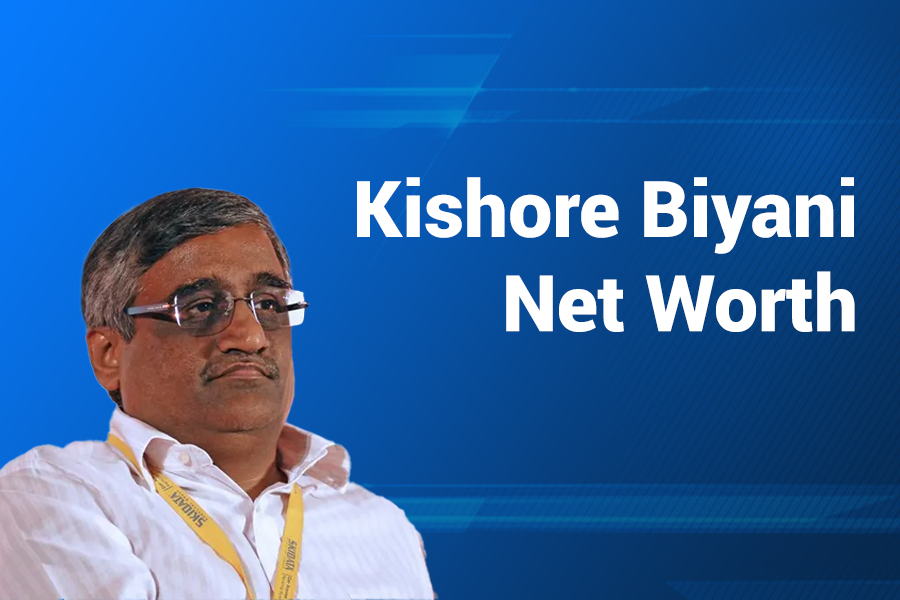Kishore Biyani, the founder and CEO of Future Group, is one of India’s most successful entrepreneurs. Known for his innovative approach to retail, Biyani reshaped the landscape of organized retail in India.
His companies, including Big Bazaar, Pantaloons, and Central, revolutionized the way Indians shopped. But what about his personal wealth? In this article, we will dive into Kishore Biyani’s net worth, explore the journey that led to his success, and analyze the strategies that built his business empire.
In this article, you will learn about Kishore Biyani’s net worth, the businesses he built, his rise to fame in India’s retail sector, and the challenges he faced.
The Rise of Kishore Biyani
Kishore Biyani’s journey to success began in the early 1990s when he saw an opportunity in the Indian retail industry. He founded Future Group, which became the parent company of major retail brands like Big Bazaar, Pantaloons, Central, and Brand Factory. These stores became staples in every major Indian city, offering everything from groceries to clothing at affordable prices.
Biyani’s vision was clear: bring modern, organized retailing to India. His idea was simple but transformative—provide quality goods at reasonable prices in a format that Indian consumers could easily understand and trust. His efforts to bring global shopping trends to India worked, and he quickly established himself as a leader in the retail sector.
Kishore Biyani Net Worth
As of 2019, Kishore Biyani’s net worth was estimated at $1.78 billion, according to Forbes. This figure reflects his success as an entrepreneur, but it also captures the challenges and setbacks that Future Group faced over the years. Biyani’s wealth primarily comes from his holdings in Future Group, which controls many of India’s top retail chains.
However, like many entrepreneurs, his wealth has fluctuated over the years. In recent years, Biyani’s net worth has been affected by the economic slowdown, increasing competition from online retailers, and mounting debts. Despite these challenges, his influence in the retail industry remains significant.
The Legacy of Future Group
Kishore Biyani’s success isn’t just measured in numbers. His legacy lies in his ability to shape the Indian retail market. The brands he founded and nurtured—Big Bazaar, Pantaloons, and Central—became household names. Big Bazaar, in particular, was revolutionary because it introduced the concept of hypermarkets in India. For the first time, Indian consumers had access to a large store offering everything from groceries to apparel under one roof.
Under Biyani’s leadership, Future Group expanded rapidly, creating thousands of jobs and contributing significantly to the Indian economy. The group’s success story became a model for Indian retail businesses.
However, the retail landscape has changed significantly in the last decade. The rise of e-commerce and online shopping platforms like Amazon and Flipkart have made it challenging for brick-and-mortar stores to compete. Future Group has faced stiff competition, especially in the grocery segment, where it struggled to adapt to the online retail revolution.
Kishore Biyani’s Business Strategies
Kishore Biyani’s business success can be attributed to several key strategies:
- Customer-Centric Approach: Biyani always placed the customer at the heart of his business decisions. By offering products at affordable prices and in convenient formats, he ensured that Future Group’s stores were accessible to a wide range of consumers.
- Innovative Retail Concepts: Big Bazaar, for example, introduced the concept of discount retailing in India. This strategy helped Biyani attract a large consumer base and build a loyal following.
- Diversification: Biyani expanded Future Group’s portfolio beyond retail. His company ventured into consumer goods, e-commerce, logistics, and even insurance. This diversification helped Future Group become a significant player in multiple sectors.
- Strategic Partnerships: Over the years, Biyani has entered into several joint ventures and partnerships with global brands to bring international products and services to India. This helped him tap into new markets and reach a broader audience.
Challenges Faced by Kishore Biyani
Despite his success, Kishore Biyani’s journey hasn’t been without its challenges. One of the biggest hurdles he faced was the increasing debt burden on Future Group. At various points, the group’s financial situation was precarious, and Biyani had to take drastic steps to manage the situation.
The rise of e-commerce also posed a serious challenge. Traditional retail businesses like Big Bazaar struggled to compete with the convenience of online shopping platforms, leading to a decline in foot traffic and sales. Future Group’s attempt to establish an online presence through Future Pay and Future Bazaar was not as successful as expected.
Another challenge was the slowdown in consumer spending, which affected many retail businesses. During periods of economic uncertainty, people tend to cut back on discretionary spending, which led to lower sales for Future Group’s stores.
Recent Developments and Future Plans
In recent years, Kishore Biyani has made efforts to restructure Future Group’s business to ensure long-term growth. One of the most significant moves was his decision to sell Future Group’s retail assets to Reliance Industries in a bid to reduce the group’s debt. This deal, valued at Rs 24,713 crore ($3.4 billion), has been one of the largest retail acquisitions in India.
Though Biyani no longer controls Future Group, he remains a prominent figure in India’s business landscape. His vision for modern retail and his ability to adapt to changing market dynamics will continue to influence the retail industry for years to come.
The Changing Retail Landscape in India
The retail industry in India has undergone a significant transformation over the past few decades. When Kishore Biyani entered the market, the concept of organized retail was almost non-existent. Traditional markets dominated the scene, and there were very few options for consumers looking for a convenient shopping experience. This is where Biyani made his mark.
His vision was clear: create a retail format that appealed to the average Indian consumer. His stores were not only affordable but also offered a better shopping experience than the local markets. Big Bazaar, for example, introduced discount retailing, which became an instant hit. It was this approach that helped Biyani build Future Group into one of the most recognized names in Indian retail.
But the story of Kishore Biyani is not just about retail. It’s about adaptability. As the market evolved, so did his business strategies. In the 2000s, Future Group quickly adapted to changes in consumer behavior, investing heavily in technology to streamline operations. They introduced loyalty programs, digital payment options, and even launched an e-commerce platform to tap into the growing demand for online shopping.
However, this shift also posed challenges. E-commerce giants like Amazon and Flipkart grew at a rapid pace, forcing brick-and-mortar stores to rethink their business models. While Biyani’s efforts to enter the online market through Future Bazaar and Future Pay were commendable, they did not see the same level of success as his physical retail stores.
Impact of COVID-19 on Future Group
The onset of the COVID-19 pandemic had a significant impact on India’s retail sector, and Future Group was no exception. With lockdowns in place, stores were forced to close for months, causing a dramatic dip in sales. The situation highlighted the fragility of traditional retail models in the face of external challenges.
However, Biyani’s ability to pivot quickly came to the forefront. Future Group ramped up its online operations, focusing on home delivery services and offering discounts to keep customers engaged. The company’s focus on consumer goods also helped them weather the storm, as people stocked up on essentials.
The pandemic also accelerated the shift towards contactless shopping and digital payments, trends that were already gaining traction before the crisis. Biyani’s investments in technology paid off, as he was able to leverage these trends to keep Future Group’s brands relevant during a difficult period.
Future Group’s Diversification Efforts
One of the key strategies that set Kishore Biyani apart from other entrepreneurs was his ability to diversify. Beyond retail, Biyani ventured into consumer goods, media, financial services, and even e-commerce. His ability to expand into new sectors allowed him to build a diverse portfolio, reducing the risk of relying solely on one industry.
This diversification strategy allowed Future Group to capture a larger market share. The company’s consumer goods division, for example, became one of the largest producers of food and beverages in India. Brands like Tata Star, Future Consumer, and Easyday helped Biyani’s group stay competitive in the face of growing retail competition.
Biyani also recognized the importance of expanding into financial services. Through Future Generali, a joint venture with Generali Group, Future Group entered the insurance business. This allowed Biyani to tap into India’s growing insurance market, which is one of the fastest-growing in the world.
The Reliance Deal: A Turning Point
The deal with Reliance Industries, where Future Group sold its retail assets, marked a turning point in Kishore Biyani’s career. The deal, valued at Rs 24,713 crore ($3.4 billion), not only helped reduce Future Group’s debt but also gave Biyani the opportunity to refocus his efforts.
While the sale of Future Group’s retail business was a difficult decision for Biyani, it allowed him to bring some stability to the company. This was particularly important as the retail industry was experiencing increased competition from both online and offline players.
The move also indicated Biyani’s willingness to adapt to market realities. He was no longer content with holding on to his empire. Instead, he made a pragmatic decision to sell, ensuring that Future Group’s brands would continue to thrive under Reliance’s ownership.
Kishore Biyani’s Future Plans
Despite stepping down from the day-to-day operations of Future Group, Kishore Biyani has no plans to retire. His entrepreneurial spirit remains as strong as ever. After the Reliance deal, Biyani has focused on new ventures, including technology, real estate, and even startups. His future plans include identifying new business opportunities in sectors where he can leverage his expertise in consumer behavior and retail trends.
Biyani has also shown interest in sustainability. As the world becomes more environmentally conscious, he sees great potential in investing in eco-friendly products and services. The rise of conscious consumerism will likely play a key role in shaping his future endeavors.
Conclusion
Kishore Biyani’s journey is a testament to his resilience and adaptability. His ability to identify consumer needs, along with his knack for creating innovative business models, has made him one of India’s most influential entrepreneurs. Despite facing several challenges, Biyani’s business acumen has allowed him to maintain a prominent position in the retail industry.
His net worth, estimated at $1.78 billion in 2019, reflects the success he has achieved. But it is also a symbol of the setbacks and obstacles he has faced along the way. Biyani’s legacy will continue to shape India’s retail landscape for years to come. His story is one of vision, strategy, and adaptability—qualities that will remain at the core of his business endeavors in the future.










